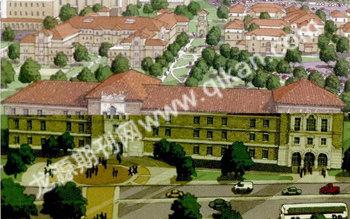你主修什么?
2009-09-14
情景:林芝和乔在聊在英国上大学的事。
Lin Zhi: My old university is having a reunion this weekend.
Joe: Really? Are reunions popular here?
Lin Zhi: Yes, quite popular. You know, people like to keep track of what their friends are doing.
Joe: I thought all that was handled by Facebook and that kind of site nowadays.
Lin Zhi: Well, you can see something of people's lives there, I guess, but it's still better to see them in person. I can't wait to see all of my old dormmates again.
Joe: How many dormmates did you have?
Lin Zhi: Eight! I mean, eight, including me. All in one room.
Joe: God, I can't imagine what that would have been like.
Lin Zhi: You didn't have a roommate?
Joe: No, most English universities you just live by yourself, especially a rich college like mine.
Lin Zhi: Really? Your school was very rich?
Joe: Yeah, well, I went to Oxford, and a lot of the colleges there are rich.
Lin Zhi: I'm a bit confused about the difference between the university and the college.
Joe: Oh, sometimes we just use college for university, but at Oxford, Cambridge, and a few other places, there are colleges within the university, and you spend most of your time at the college, like a school-within-the-school. And my college was very well off, so we had big rooms to ourselves, even bathrooms in the second year. I picked it because my dad and my granddad both went there.
Lin Zhi: How do people normally choose their universities? By where their parents went?
Joe: Not normally. That was just a bit of sentimentality on my part. Um, it depends on a lot of things. The most important is where will take you, of course – you have to apply before you do your final exams, so most of the offers are 'conditional' – that is, you have to get certain grades at A-Level before you take them. Like my offer was AAB – I needed to get 2 As and a B – to get in.
Lin Zhi: What would have happened if you didn't get them?
Joe: If you only miss it by a grade, you can normally persuade them to let you in anyway. Otherwise, you have to go to your backup choice – normally you pick one university with a high offer, and one that you're pretty certain you'll get the grades for. Like I picked Oxford and Manchester, where I had a BBB offer.
Lin Zhi: Is it the same in America?
Joe: I don't think so. I think there they just either accept you or don't, because they don't have as unified an exam system – well, they have the SATS, but you take those before you apply. And to get into the best universities you have to have a lot of extracurricular activities, doing charity work and hobbies and things, but that's much less important in the UK. Plus of course in the US you have to think about cost, whereas our universities are almost free.
Lin Zhi: Oh, of course. I had a friend who said his American education cost his family nearly $100'000.
Joe: Yeah, people have much bigger student loans than us. But they have more scholarships available if you're clever, I guess.
Lin Zhi: When did you pick your major? In the second year?
Joe: Nah, we don't have 'majors.' We pick our subject from the start, and we don't call it a 'major' – we say we're 'reading' something.
Lin Zhi: That's confusing!
Joe: I know! But you get used to it. Like, I read History at Oxford, my sister read Natural Sciences at Edinburgh. And our degrees are only three years, so they're more concentrated than the American ones.

Lin Zhi: So you have to decide straightaway when you apply? At 17? That seems too early.
Joe: Yeah, you just have to decide what you think is best for you. But it's very easy to switch once you're there – or even to do one year of one course, and two years of another. So you're not locked into it. I had a friend who switched from ASNAC to Law.
Lin Zhi: ASNAC?
Joe: Anglo-Saxon, Norse, and Celtic.
Lin Zhi: Wow, I bet his parents were happy he switched to Law.
Joe: Well, it certainly improved his job prospects …
林芝:我的母校要在本周末举行一次聚会。
乔:真的么?聚会在这里很普遍么?
林芝:是啊,很普遍。你知道,人们想了解自己的朋友们都在做什么。
乔:我以为现在这些都由Facebook和其他类似的网站搞定了呢。
林芝:噢,你在那里(网站上)能看到别人的一部分生活,我觉得是这样,但还是见到本人好些。我迫不及待地想再次见到我所有的室友。
乔:你有几个室友?
林芝:八个。我的意思是,包括我。都在一个房间里。
乔:天哪,我无法想象那到底会是什么样子。
林芝:你没有室友?
乔:没有,在大多数英国大学,你是一个人住的,特别是像我们那样有钱的学院。
林芝:真的?你们学院很有钱?
乔:是啊,我上的是牛津,许多学院都很有钱。
林芝:我对于大学和学院的区别不太清楚。
乔:嗯,有时我们也称大学为学院,但在牛津、剑桥和其他一些地方,大学里有包括很多学院,而你大多数时间是在学院里,就好像校中校。我的学院很有钱,所以我们有自己的大教室,第二年还有浴室。我选择它是因为我老爸和我爷爷都是在那儿上的。
林芝:人们通常都是怎样选择大学的?家长上哪儿就上哪儿?
乔:这样的不多。只是我对它有感情。哦,这取决于很多方面。当然,最重要的是哪里要你,你必须在期末考试前申请,所以多数的录取机会都是“有条件的”,也就是说,你的预科成绩必须达到一定分数才能去上。比如我大学要求的成绩是AAB,因此我要取得两个A和一个B,才能考上。
林芝:如果你成绩达不到会怎么样?
乔:如果你只差一分,你通常可以请求他们录取你。不然的话,你就得选择后备学校——通常你选择一家成绩要求高的,以及一家你十分确定自己的分数达到要求的。比如我选择了牛津和曼彻斯特,后者要求的成绩是BBB。
林芝:美国也是这样么?
乔:我觉得不是。我想在美国是要么录取你,要么不录取你,因为他们没有统一的考试体制,他们虽然有标准成绩考试,但你要先参加考试,然后才能提出申请。而且要想上顶级学府你还得有很多课外活动,参加慈善工作,有业余爱好,等等,但这些在英国就没那么重要了。另外,在美国你还得考虑上学成本,而英国大学基本上是免费的。
林芝:哦,那当然。我的一个朋友说他上大学家里面将近花了10万美元。
乔:是啊,他们的助学贷款比我们多很多。但在美国如果你聪明,会有机会获得更多奖学金,我猜是的。
林芝:你是什么时候选的专业?大二么?
乔:不是,我们没有“专业”。我们一开始就选了课程,但我们不称之为“专业”,我们是说在“读”什么。
林芝:这我就不明白了。
乔:我知道。但你得适应它。比如说,我在牛津读历史,我妹妹在爱丁堡读自然科学。而且我们取得学位只需要三年,因此课程比美国密集。
林芝:那你得在申请时就做好决定?17岁时么?太早了吧。
乔:是啊,你得决定什么是对你最好的。但上大学后更换很容易,甚至可以一年上这种课程,另外两年上别的课程。所以你不是固定在一个课程上。我的一个朋友从ASNAC转到了法律。
林芝:ASNAC?
乔:盎格鲁撒克逊语、诺尔斯语和凯尔特语。
林芝:我觉得他转到法律他爸妈肯定很高兴。
乔:嗯,这肯定改善了他的工作前景……
Notes
1. keep track of
意为“了解、记录”。
例句:As a doctor James has to keep track of the latest developments in medicine.
作为一名医生,詹姆斯必须了解医学的最新发展动态。
Her mother used to keep track of every penny she spent.
她母亲从前把自己所花的每一分钱都记下来。
2. in person
意为“亲自”。
例句:You must come in person.
你必须亲自来。
3. well off
意为“富裕的、阔绰的”。
例句:He was well-off materially.
他在物质上很富裕。
4. lock into
意为“受困于、陷于”。
例句:A large percentage of these groups remain locked in poverty.
这些团体里有很大一部分人仍然很贫穷。
The two countries are locked in a dispute over the islands off the northern coast.
两国在北方沿海附近的岛屿上存在分歧。
5. Anglo-Saxon, Norse, and Celtic.
意为“盎格鲁撒克逊语、诺尔斯语(古斯堪的纳维亚语)和凯尔特语”,这三种语言是英语的主要来源。
Links
英国大学申请程序详解
英国大学深受本国和外地留学生欢迎,是全世界留学的首选地点之一。一般来说,学生可以在申请表上填写五个志愿。申请表填写完毕后,学生可以单独或集体在网上提交申请表。值得注意的是,在申请例如医科一类的热门专业时,学生们应该尽早提交申请,以免错过申请截止日期。接下来,负责英国高校录取工作的英国大学与院校入学委员会(UCAS)就会把收到的申请转发到各个院校,然后由各院校做出录取决定。
录取决定
高校做出的录取决定一般分为两种,即无条件录取(unconditional offer)和有条件录取(conditional offer)。后者的意思是说,学生在被正式录取之前必须通过某项考试或达到某些标准。对于国际学生来说,特定的语言考试成绩往往是有条件录取通知书中开出的前提条件。到了3月份,学生们就会接到来自一所或多所学校的录取通知。如果被多所学校录取,申请者可以选择两所院校,一所作为“第一志愿”,另一所作为“第二志愿”用来保底。这一过程大约会在5月初完成。8月是考试成绩公布的时候,这个时候学生就会知道自己能否满足录取通知上的先决条件,并作出最终的择校决定。如果考试成绩没能满足任何一所理想学校的录取标准,学生还会有机会在录取名额未满的大学中,选择自己相对喜欢的学校。
申请时间
每年9月中旬到1月中旬,是英国大学的申请季节。但像牛津和剑桥这样的英国名校,以及药学、医学和兽医学等热门专业,往往在每年的10月15日就结束了下一年度的招生工作。此外,一些艺术和设计课程的申请时间也可能会有所不同,这些专业的申请截止日期往往较其他专业晚。相对而言,英国院校赋予海外学生的申请时间也相对较长,有的学校到6月底还继续招收海外学生。
还有机会
一般来说,学生会在2月底收到自己第一批申报的院校发来的录取通知书。但如果没能被最初填报的5所院校中的任何一所录取,别担心,你还有机会。每年2月底到6月底,尚未被录取的学生还可以再进行一次申请,但与之前不同的是,学生这次只能一次填写一个志愿。
6月之后,各院校会开始最后一次“清仓”活动。在这个过程中,招生名额尚未用罄的大学可以和没有拿到录取通知的学生进行“配对”,最大程度地帮助学生实现接受高等教育的心愿。
